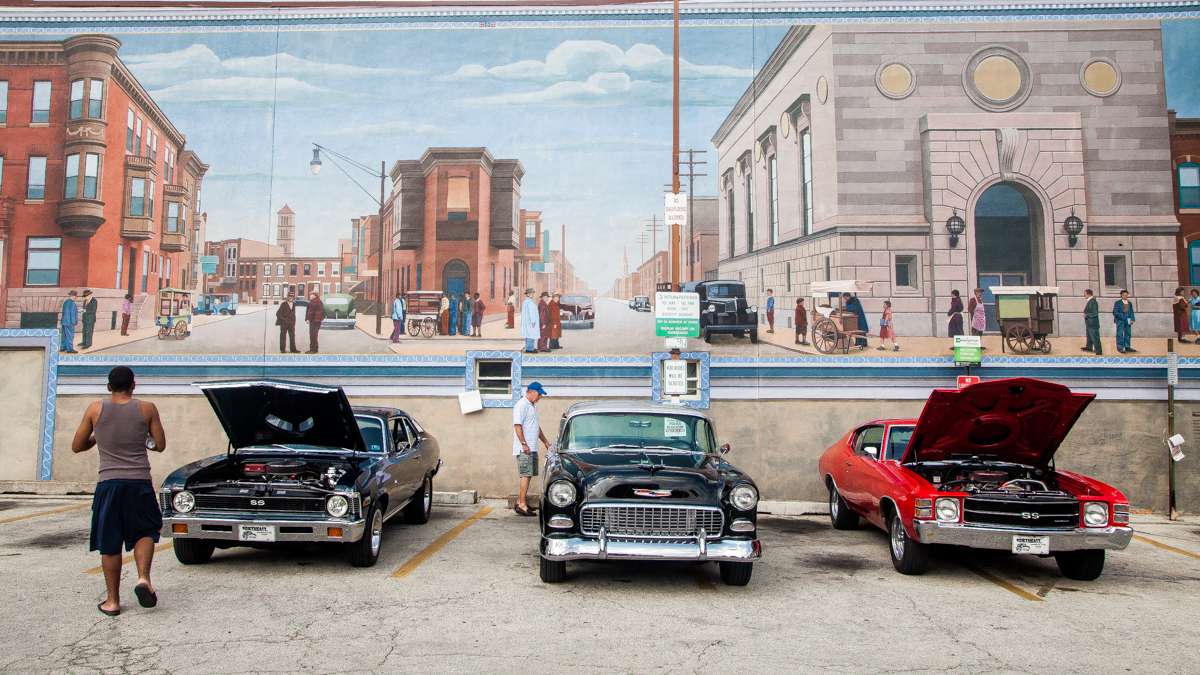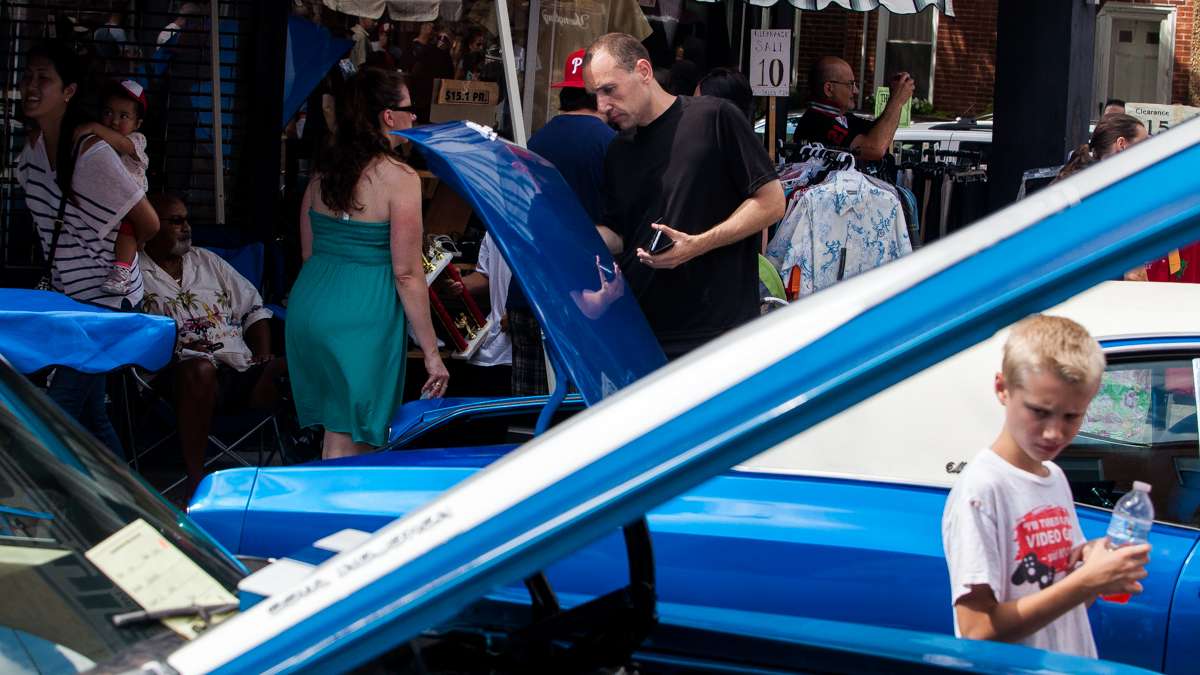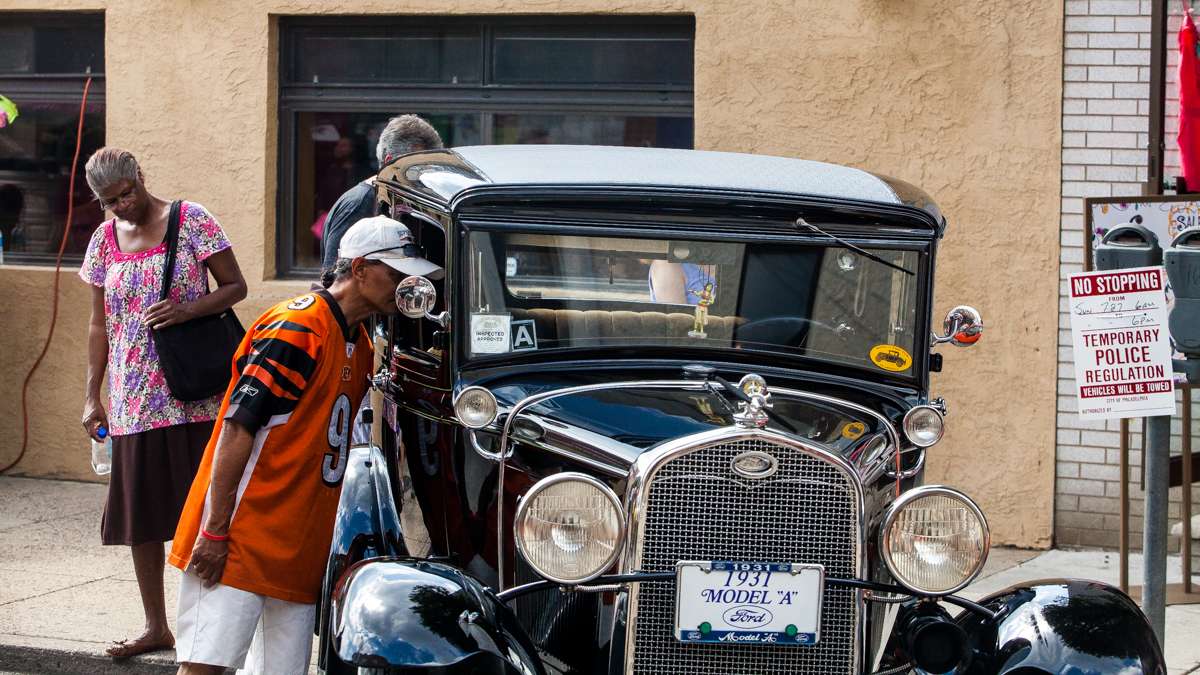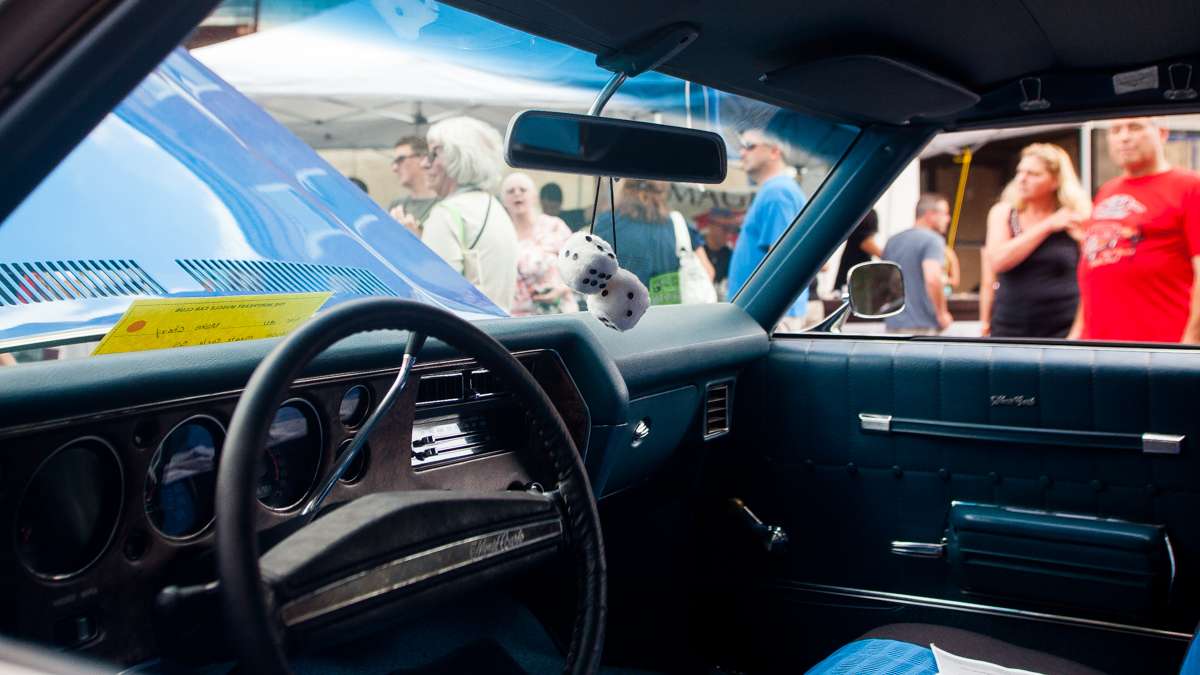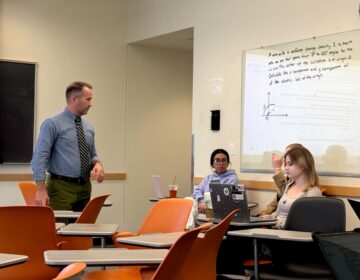Through bonds of mentorship, Philly student defies culture of low expectations
ListenWhile the Philadelphia School District grapples with systemic funding shortfalls, students rely now more than ever on relationships with adults outside of the school system. This is the story of the power of one such relationship.
According to the most recent longitudinal study of Philadelphia graduation rates, a mere 10 percent of students who begin ninth grade in Philadelphia public schools manage to persist all the way through to college graduation.
In order to raise achievement levels, the city and state have vastly restructured the shape of public education in Philadelphia over the last 15 years, rapidly expanding both district and charter options – to mixed results.
While the school district continues to grapple with systemic, recurring and devastating funding shortfalls, students and parents currently find themselves desperately hoping that schools will be able at least to retain last year’s admittedly insufficient levels of staff and resources.
In the face of these shortcomings – with faculty and school support-staff levels at dreadful lows – students now more than ever must rely on their relationships with family members and other adults outside of the school system.
This is the story of the power of one such relationship.
At first glance, Delialah Burns and Madeline Sherry seem like they’d have absolutely nothing in common.
Delialah, 25, grew up in subsidized housing in Kensington and now lives in an apartment in Lawncrest. During the week, she works a day-shift in center city as an administrative assistant and takes night classes at Temple University towards her bachelor’s degree.
Works ends at five. Classes start at five-thirty.
The florescent orange glow of a Broad Street subway car is the closest she gets to an office of her own.
“I go to work, to school and study on the ‘sub,’ do my homework on the ‘sub,’ said Delialah, wearing determined brown eyes, and a business-professional blazer. “Whenever I’m free and I’m sitting somewhere, I do whatever I have to do.”
Madeline, 61, dresses in stately silhouette and owns a luxuriously handsome condo on Rittenhouse Square. From her high-rise window, South Philadelphia stretches below in a maze of intersecting lines that sprawl with the bustle of city life.
She grew up on the main-line, and has risen through the ranks in her family’s chosen profession.
“I’m an attorney. I come from a family of attorneys. I’m married to an attorney. My oldest son is an attorney. I have two brothers who are attorneys, a sister who’s an attorney,” said Madeline, “and the list goes on.”
But despite their apparent differences, Delialah and Madeline have been integral parts of each other’s lives for close to a decade, thanks to the Philadelphia Futures mentorship program that brought them together, a program that requires a five year commitment at minimum.
“This is not mentoring-lite, this is real mentoring,” said Madeline, who also sits on Philadelphia Futures’ board of directors. “This is mentoring that means that there’s a communication with the student at least once a week, and then an in-person meeting at least once a month.”
For Delialah, who was attending Edison High School in North Philadelphia when they first met, Madeline’s arrival came at a time when she had almost no one else to turn to.
“At one point, before I had met Madeline I didn’t have anyone to talk to, so I was always in my head and just was to myself,” Delialah said.
Delialah was raised in a single parent household with her two younger sisters. She says her mom – who had her when she was 18 – instilled in her the importance of education and tried to awaken her to a life beyond Lehigh Avenue.
“Where I’m from, and people in my neighborhood, 25, if you’re not pregnant, that’s old,” Delialah said. “But she didn’t want me to go that route. She wanted me to finish school. She wanted me to live my life before I thought about settling down.”
But despite her mom’s best efforts, her mom couldn’t be the model that Delialah says she needed.
“It was nothing for me to go off of,” she said. “She couldn’t say, ‘Hey, I can help you out with this because I’ve been through this.'”
Delialah says her childhood was a formative experience for her mother as much as it was for herself.
“Having three kids at a young age is hard when you’re still trying to figure out who you are,” said Delialah of her mom. “She was still a child and I was a baby, but we were both growing together, and so we learned from each other pretty much.”
At Edison, Delialah was shy as a classmate, but eager and attentive as a student. After classes, she’d stay in the building until early evening – forging bonds with the teachers who stayed late to grade papers and prepare for the next day’s work.
The unthinkable
As high school progressed, the cracks in Delialah’s family life became more strained and she increasingly found herself taking care of her younger siblings.
School, though, remained a priority.
By the time she was a senior, Delialah was a strong candidate for college – setting her on a track to redefine her family and defy her neighborhood’s culture of low-expectations.
But just as Delialah felt her ascent gathering momentum, the unthinkable happened.
Seemingly out of nowhere, Delialah’s mother disappeared. She had gone on vacation with Delialah’s youngest sister, and decided that she wasn’t coming back to Philadelphia.
Delialah didn’t find out until – sitting in the devastating stillness of the empty house – she received her mother’s call.
“She just moved. And she knew that I was staying in Philly, so she left me the house, but I didn’t know she was moving,” Delialah said, fighting back tears.
Suddenly Delialah was head of a household, responsible not just for her other younger sister, who was a junior at Edison, but for the rent, for the utility bills – for everything.
Delialah had worked since 10th grade, and was used to contributing to the family pot, but nothing could have prepared the teenager for this burden.
Her own school work started to feel like an after-thought.
And like an albatross hanging from her neck, the emotional toll of being abandoned weighed on her ambitions, narrowing her sense of the possible.
“When that responsibility was given to me I just…I lost it,” she said. “I saw myself slowly getting depressed and not really recognizing my self worth.”
In the midst of this, as many of her classmates reveled in the accomplishment of finishing high school, Delialah staggered to graduation in a daze.
“I had my uncle, and my aunts, and Madeline and my grand-mom telling me, ‘You know, you’re already halfway there, just finish it. Don’t let this define you. Just do what you have to do and move on.'”
Madeline can recall that time in Delialah’s life vividly.
“Most students, it’s hard enough just to think about starting college, but Delialah was thinking about starting college and also figuring out how to maintain a family home that she could come back to, because school does not let you live there 12 months a year,” she said.
‘Our hearts spoke’
It was through this ordeal that, in Madeline, Delialah found a bridge upon which to build a more stable life.
Not that the relationship sparked in an instant.
“I really wasn’t open to the situation because of what was going on,” Delialah said, “and I just kind of didn’t want to put a smile on and accept someone else in my life and allow them to do what has been done to me over again.”
But faster than Delialah thought possible, Madeline earned her trust, showed her a loyalty that came without strings attached.
“That’s how I knew that she was put in my life for a reason because I don’t open up to anyone, and I opened up to her in a short amount of time,” she said. “It’s just kind of like our hearts spoke to each other.”
When Madeline talks about Delialah, she speaks with the gravity of a veteran litigator, the unyielding warmth of someone unafraid of expressing love.
“I like to think of myself as a responsible person. That was something that I saw in Delialah that immediately connected us,” she said. “Although we’re many years apart and have differences in our lives, that sense of responsibility is something that’s always connected the two of us.”
During that period of her life, Delialah says she could have allowed herself to repeat the fate that her mother had raised her to avoid – could have dropped out of high school, and become another teen mother.
“When I wasn’t in such a good place, it could be so easy for me to fall into those traps,” Delialah said, “but I didn’t allow myself to fall into those traps because I had support from my friends and Madeline.”
Over the years, Madeline’s mentorship took many forms—everything from advice and emotional support to hot meals, dependable rides and pillows to rest her head.
The dream of college
Difficult as it was, Delialah made it through her senior year and went to Penn State Schuylkill Haven Campus that Fall with hopes of, like Madeline, becoming an attorney.
All the while, she worked in order to help pay the bills at the Kensington apartment where her sister still lived.
By the end of her second semester, the pressure of juggling so many responsibilities overcame her, and she dropped out of school.
The blow could have crushed her, could have made her just another statistic of Philadelphia High school students who never end up finishing college.
But she had Madeline.
“I messed up and I was really, really hard on myself,” said Delialah, but, “she just said, ‘You know, things happen. The most important part is that you learn from it and that you do something about it.'”
Delialah took a semester off, found another job, and the next year enrolled in the Community College of Philadelphia, where she thrived and earned her associate’s degree.
To get that point though, Delialah needed to come to terms with her mother, she says, who now lives in Hawaii.
So she forgave her.
“It does sound difficult, because it was a lot, but I realized,” she said. “If I didn’t forgive, I would still be stuck in that head-space and that same time frame, and I needed to move on from that.”
Delialah admits that her relationship with her mother remains a “work in progress,” but stresses that they “truly love one another.”
“Whatever has happened has happened,” she said, “and its been put in our lives and in my life to humble me, and it’s prepared me for whatever I have to deal with once I am older.”
Now at Temple, Delialah is dedicated to earning her degree, and hopes to become a journalist. She expects to graduate in the winter of 2015, and is thinking of pursuing a graduate degree.
For Madeline – who is no stranger to strength and success – witnessing Delialah overcome obstacles with such grace, determination and maturity has been astounding.
“I hope I made a difference in Delialah’s life,” she said, “but I can absolutely tell you she’s made a difference in my life.”
Madeline has now begun to mentor another student, with whom Delialah too has forged a relationship.
One day, Delialah hopes to become a mentor herself, someone who can do for a struggling young person what Madeline did for her.
“Having someone in my life that shows extreme professionalism and unconditional love allows me to show it in my life,” Delialah said, “and allows me to accept what my past is and move on.”
WHYY is your source for fact-based, in-depth journalism and information. As a nonprofit organization, we rely on financial support from readers like you. Please give today.



